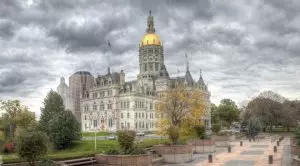 The leaders of two federally recognised tribes, the Mashantucket Pequots and the Mohegans, proposed to Connecticut state officials a 25% cut of their overall revenue if the lawmakers agree to clear the tribes’ third casino project to General Assembly. The offer was extended in the form of a letter addressed to several state officials, including Connecticut Governor Daniel Malloy and the state’s Attorney General George Jepsen.
The leaders of two federally recognised tribes, the Mashantucket Pequots and the Mohegans, proposed to Connecticut state officials a 25% cut of their overall revenue if the lawmakers agree to clear the tribes’ third casino project to General Assembly. The offer was extended in the form of a letter addressed to several state officials, including Connecticut Governor Daniel Malloy and the state’s Attorney General George Jepsen.
The two tribes operate jointly the only two licensed gambling establishments on the territory of the state, namely the Foxwoods Resort Casino and the Mohegan Sun Casino Resort. According to the terms of the current agreement between the two parties, the tribes are required to allocate 25% of their slot revenue to the state of Connecticut.
However, the Mohegan and the Mashantucket Pequot tribes are looking to open another casino which is to be located off their tribal lands in the northern part of the state, near the town of East Windsor. The project was met with opposition on behalf of the East Windsor community.
The letter containing the tribal offer was signed by Kevin Brown, Chairman of the Mohegans and Rodney Butler, leader of the Mashantucket Pequot tribe. The tribal leaders also addressed the proposed amendments during a news conference, held at the Capitol yesterday. The two tribal chairmen revealed they not only intend to honour the existing slot revenue agreement, but are also improving the offer by proposing a 25% cut of their third-casino’s table games revenue.
The amendment proposal was made after Attorney General Jepsen warned the approval of the third casino comes with substantial risks. Jepsen suggested that building a third casino off tribal territory threatens to void the gaming compact’s guarantee of slots exclusivity. Under the terms of the existing agreement, the state of Connecticut collects over $260 million on annual basis.
As Connecticut currently faces a deepening budget deficit, the potential loss of revenue has become a sensitive topic for the state’s officials. This might explain the legislators’ reluctance to clear the path for the tribes’ third casino as this might put the state’s current sources of revenue at risk.
During the news conference, Mohegan Tribal leader Kevin Brown told reporters he is confident that the federal Bureau of Indian Affairs would not reject the proposed amendments to the existing agreement. Brown insisted that even if the amendments are turned down by the Bureau of Indian Affairs, the state would continue to collect its 25% cut of slot revenue.
Connecticut House Speaker Joe Aresimowicz, who was among the officials to meet with the tribal leaders, commented that while the guarantee provided by the tribes is certainly helpful, there is still a “50-50 chance” of the proposed legislation coming up for a vote at 2017’s legislative session, which adjourns at the beginning of June.
At the present moment, Connecticut officials are considering yet another bill that would launch an open tender for the rights to build a commercial casino on non-tribal land. MGM Resorts which is currently in the process of completing a $950 million casino resort in Springfield, Massachusetts over the border from nearby East Windsor, has spoken in support of the open tender. What is more, MGM Resorts has even threatened lawmakers with legal action if they award the commercial casino license to the Mashantucket Pequot and Mohegan tribes.
The two tribes are pushing for a third casino located on non-tribal territory in an attempt to prevent players from travelling outside the state of Connecticut to gamble. The two tribes have gone as far as threatening to stop paying the 25% slots revenue if state officials continue with their open tender.
- Author


